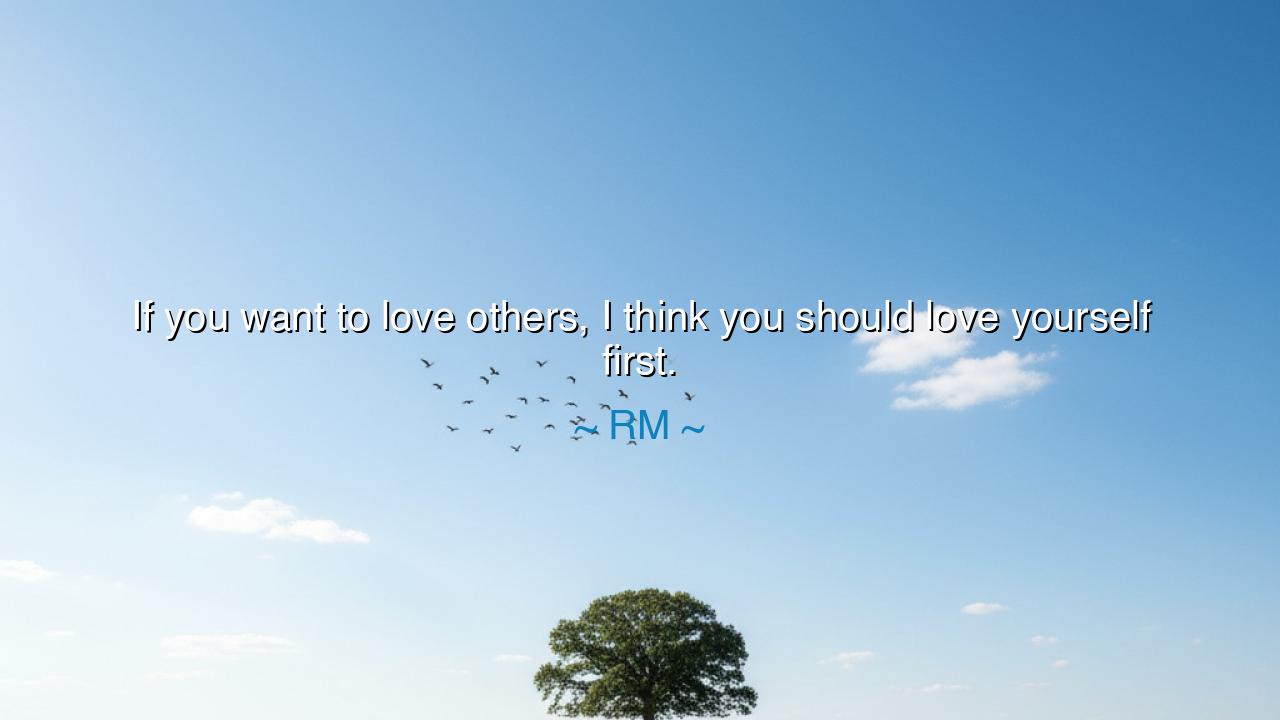
If you want to love others, I think you should love yourself






“If you want to love others, I think you should love yourself first.” Thus spoke RM, the philosopher-poet of a new generation — a voice rising not from the ivory towers of scholars, but from the living hearts of the people. In these few words, he breathes ancient wisdom into the language of the modern soul. He reminds us that love, that most sacred of human powers, begins not in the embrace of others, but in the quiet reconciliation with oneself. To love yourself is not an act of vanity, but of honesty — to see yourself not through the eyes of judgment, but through the eyes of compassion. Only then can love flow outward, pure and unbroken, to others.
For how can one who despises their own reflection truly see beauty in another? How can one who feels unworthy give worth to someone else? The one who has not learned to forgive themselves will always struggle to forgive the world. This is the truth RM speaks: self-love is the seed from which all love grows. It is not the loud self-admiration of pride, but the quiet strength of understanding — the recognition that you, too, are a fragment of the divine, flawed yet worthy, broken yet whole. To love oneself rightly is to stand before one’s own imperfections and say, “Still, I am enough.”
The ancients knew this truth well. The great teacher Buddha said, “You yourself, as much as anybody in the entire universe, deserve your love and affection.” He taught that self-compassion is not selfishness, but liberation — for when you make peace with yourself, you cease to inflict your suffering upon others. Likewise, in the West, the philosopher Aristotle spoke of philautia — self-love — as the foundation of virtue. The man who loves himself truly, he said, will act nobly, not from greed, but from goodness. RM’s wisdom, born in the crucible of fame and modern turmoil, carries the same eternal melody: before you can lift another soul, you must learn to lift your own.
Consider also the story of Nelson Mandela, imprisoned for twenty-seven years, stripped of freedom and dignity. He emerged not with bitterness, but with compassion — for his captors, for his people, and for himself. When asked how he could forgive those who had wronged him, he said that to carry hatred in his heart would only chain him further. His forgiveness was not weakness, but a triumph of self-love — the love that refuses to let pain dictate one’s soul. In loving himself — his humanity, his dignity, his inner peace — he found the power to love his enemies, and in doing so, he transformed a nation.
But there is danger, too, in misunderstanding this teaching. To love oneself does not mean to indulge every desire or excuse every flaw. True self-love is disciplined and kind — it nurtures the best within you while accepting the worst without shame. It is the balance between compassion and accountability. The one who loves themselves truly will care for their body, guard their mind, and refine their spirit, for they know they are caretakers of a sacred flame. Love without self-respect is weakness; self-respect without love is pride. The wise walk between the two.
RM’s words also speak powerfully to our time — a time when many lose themselves in comparison, in doubt, in the noise of the world. He himself has stood beneath the heavy crown of expectation, seen both glory and loneliness. Yet from that place he calls out to others: before you try to heal the world, heal your heart. Before you give love, fill your own cup. For the one who is empty cannot pour into others. Only when you know your own worth can you recognize the worth in every soul you meet.
So, my child, take this truth to heart. Look within before you look outward. Speak to yourself gently, as you would to someone you cherish. Forgive the times you failed, honor the efforts you’ve made, and tend the garden of your heart with care. When you learn to love yourself — not as a god, but as a growing, striving being — you will find that your love for others deepens and expands beyond measure.
And remember this: to love yourself first is not the end of love, but the beginning. It is the root from which compassion grows, the fountain from which understanding flows. When you see yourself clearly and accept yourself wholly, the walls between you and others begin to fall. Then, every act becomes an offering of love — not out of need, but out of abundance. This is the harmony RM speaks of, this is the ancient truth reborn: that the heart at peace with itself can finally become a heart at peace with the world.






AAdministratorAdministrator
Welcome, honored guests. Please leave a comment, we will respond soon